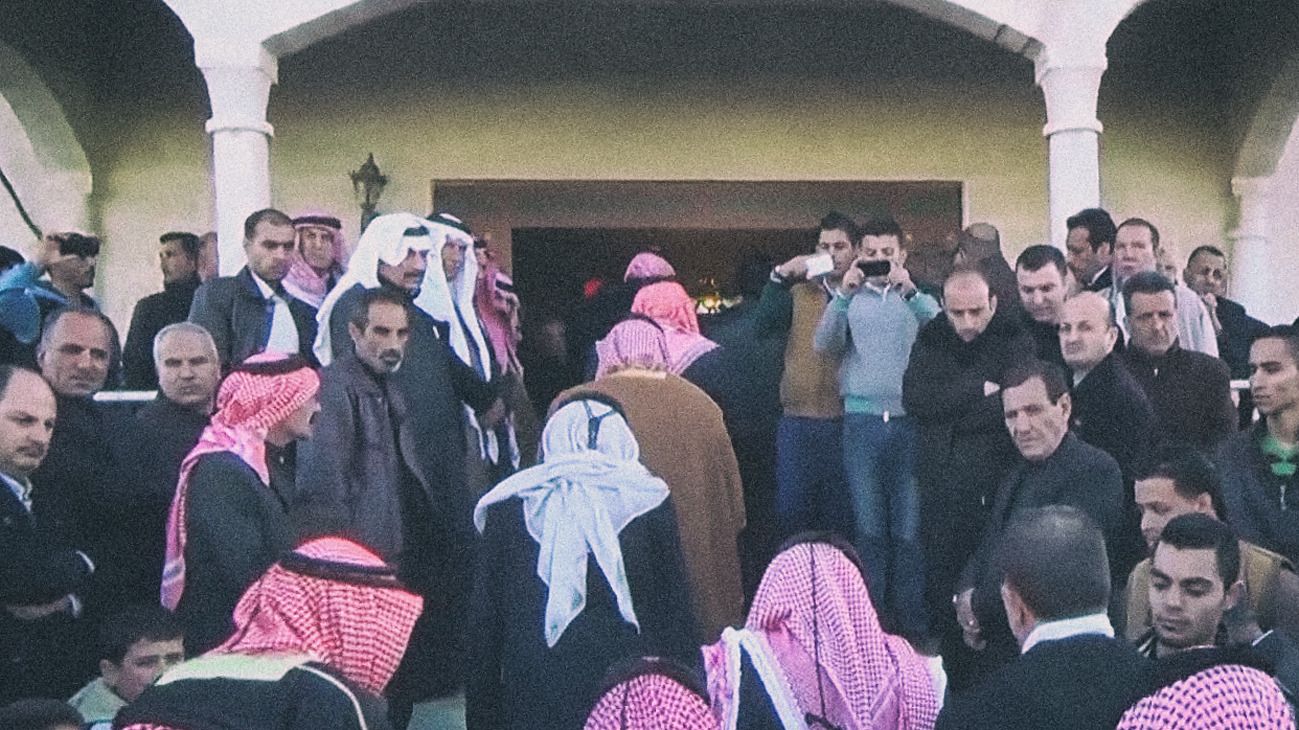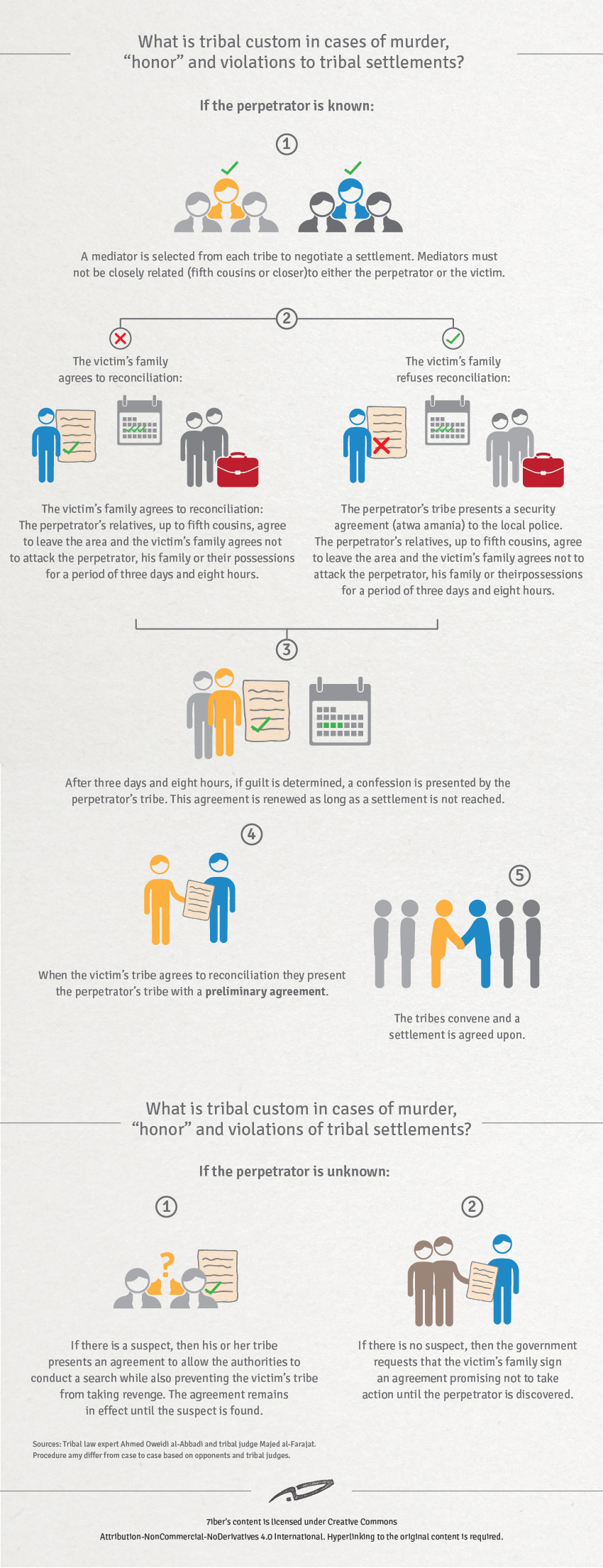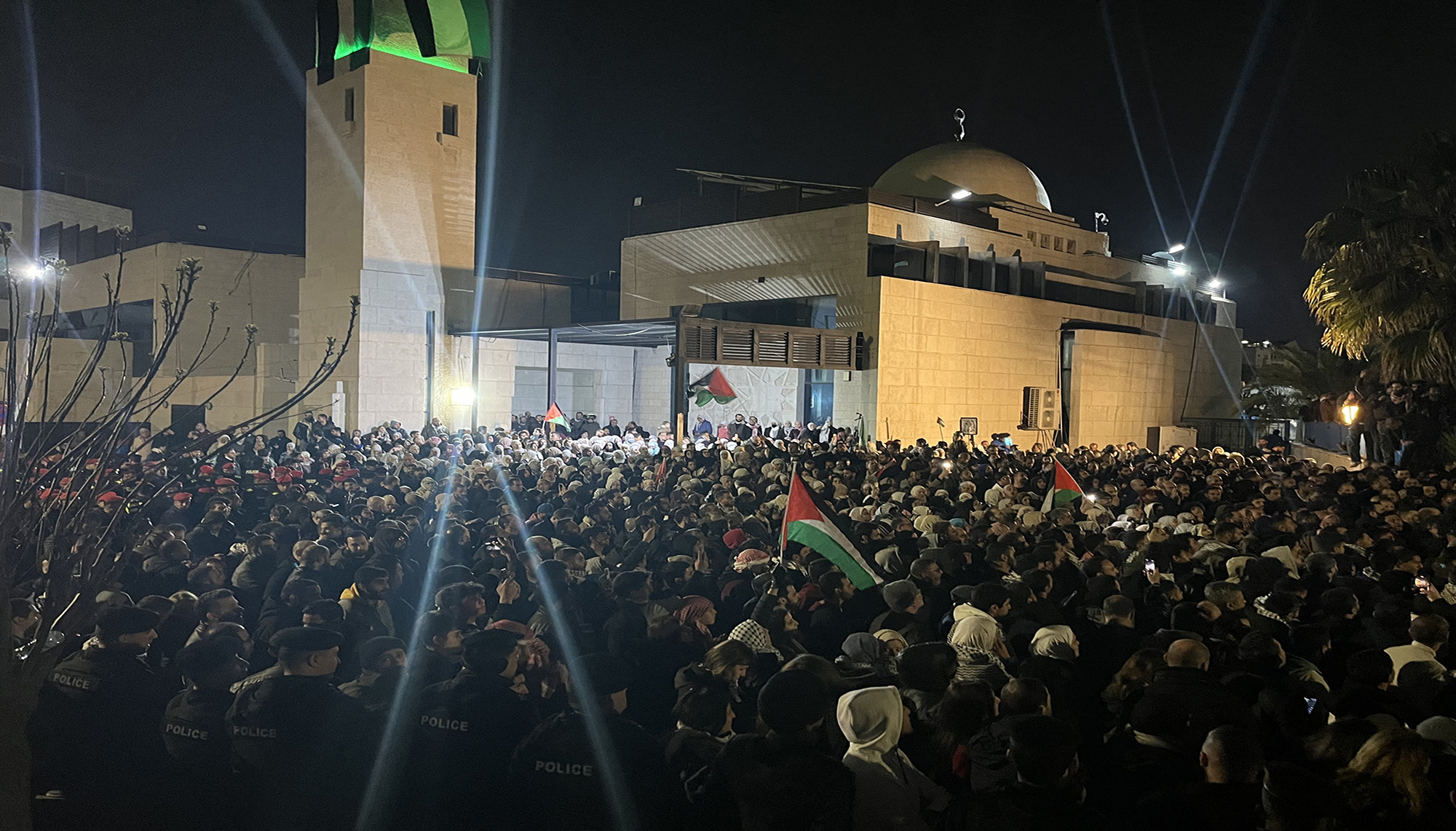Translated by Orion Wilcox
Mohammed al-Oleimi spent 20 years in prison for murder—the full length of his sentence. But on the day of his release, he was detained again under the direction of the Deputy Governor of Irbid. The reason? Over the previous two decades, Mohammed’s tribe had failed to reach a settlement with the tribe of his victim.
Irbid’s Deputy Governor told the al-Oleimi family that—despite Mohammed’s completion of his entire prison sentence as ordered by Jordan’s Criminal Court, Court of Appeals and Court of Cassation—the only thing that would end the case was a tribal settlement, according to what Mohammed and his brother told 7iber.
The deputy governor told Mohammed that his detainment was meant to prevent the victim’s family from seeking revenge. So Mohammed and his family had to enter into negotiations with the victim’s tribe that lasted a year and a half, and resulted in an agreement requiring Mohammed’s tribe to pay a diyyeh (compensation paid to a murder victim’s family by the family of the murderer) they could not afford.
Mohammed’s is not the only case in which tribal custom has come into conflict with civil law in Jordan. In past decades, the Jordanian government has deferred to tribal custom in several court cases, despite the tribal system’s inconsistency with the state’s laws and constitution. Furthermore, the government has sought to integrate some of these tribal customs into the state’s civil laws. The Bureau of Legislation and Opinion recently announced that some tribal customs would be included in a draft of the 2016 Crime Prevention Law.
Advocates of tribal customs say that wide acceptance of the system in Jordanian society allows for quick action and the circumvention of crises following serious crimes. Secondly, they argue that the punishments enforced by the tribes are appropriate and acceptable to the families of victims. For these reasons, the deference to tribal custom ensures that cases are resolved completely, leaving no desire for revenge after a tribal settlement is reached.
But rights activists and lawyers question what this says about the authority of the government and its ability to enforce laws equally and fairly. The government, they argue, has the responsibility to protect all individuals’ rights and ensure their safety—including the rights and safety of murderers and their families.
Multiple punishments for one crime
Mohammed al-Oleimi and his brother described their attempts to reach a tribal settlement that would end the former’s legal troubles: “More than 20 years ago we requested a settlement with the victim’s tribe. They refused to accept unless we paid 70,000JD, and we didn’t have that kind of money,” says Mohamed’s brother. “They said ‘let the law take its course.’ Well, now the law has taken its course,” he adds.
After having spent 10 years in prison, Mohammed received a special pardon from the King. But the pardon required that the victim’s family drop their right to compensation. Because the tribes had not agreed on a settlement, Mohammed remained in prison, says his brother.
Mohammed completed his entire sentence before being returned to prison by an administrative decision issued by Irbid’s Deputy Governor—an authority granted to administrative officials by the Crime Prevention Law. Thus began the period of negotiations between Mohammed’s tribe and that of his victim, who had demanded a diyyeh of 70,000JD 20 years prior. The amount of the diyyeh was gradually reduced to 25,000JD. But the al-Oleimi family still couldn’t afford it, so Mohammed requested that they end negotiations and explore legal avenues to obtain his release.
“Why do I want to reach a settlement? What will I get out of a settlement after 20 years in prison?” asks Mohamed.
Mohammed’s family sought the help of several legal aid organizations including the National Center for Human Rights (NCHR) and the Justice Center for Legal Aid (JCLA). With their assistance, Mohammed was released from prison four months ago, after signing an agreement not to enter the city of Irbid, where his victim’s family lives, under a penalty of 30,000JD.
The infographic below explains the procedures dictated by tribal custom in cases of murder:
Formalizing tribal custom
Jordan has had three tribal laws, the most important of which being the Tribal Courts Law of 1936, which remained in force until 1976, when legislation was introduced abolishing it. In practice, the Tribal Courts Law continued to be used until 1987, when King Hussein issued a non-binding royal decree defining how tribal custom should be taken into account in court cases.
Following the 1987 decree, the Kingdom’s tribes ratified several agreements seeking to limit abuses in the enforcement of jalwa [banishment: the removal of a criminal’s family and relatives from the area where the victim lives] and related measures. Recently, the Bureau of Legislation and Opinion announced an effort to integrate some tribal customs into civil law by including them in a draft amendment to the Crime Prevention Law of 2016. The amendment takes tribal custom into consideration in cases of “murder, honor and violation of tribal settlements,” and formalizes them in legal texts.
One of the tribal customs included in the proposed amendment is the jalwa. Article 16 of the draft amendment states that “jalwa shall only include the perpetrator, his children and his father. The period of banishment shall not exceed one year with the possibility of renewal with the approval of a civil administrator.”
Saleh al-Armouti, the former head of the Jordanian Bar Association, opposes the “legalization” of the jalwa, a practice which he argues is “in violation of the constitutional right of individuals to residency and movement.” Al-Armouti also opposes the Crime Prevention Law in general because he says it infringes upon judicial authorities and the constitution.
Al-Armouti’s opposition to formalizing tribal custom is based on the legal principle: “There can be no crime or punishment without legislation.” Moreover, al-Armouti asks what crime the brothers and father of a criminal committed in order to deserve punishment.
On the other hand, Bureau of Legislation and Opinion President Nofan al-Ajarmah says the issue is a matter of practicality: “In reality, jalwa is applied and supervised by the governors, and we can’t deny that. The process occurs before the state and it’s very difficult to get rid of. What we are working on is to at least reduce the damage caused by the practice in preparation for its eventual abolishment.” In al-Ajarmah’s opinion, the current amendment to the Crime Prevention Law is the lesser of two evils.
Al-Ajarmah’s argument is in line with tribal judge Majed al-Farajat’s call for the legalization of jalwa “so that all Jordanian tribes operate under one law that requires them to banish only those individuals included in the criminal’s family notebook [i.e. the individual’s father and sons]. This will prevent some tribes from enforcing specific demands or harsh conditions.”
Al-Armouti, the former Bar Association head, is surprised by al-Ajarmah’s justifications. “The status quo cannot impose on the state a law that is in violation of the constitution,” says al-Armouti. “Jordan is a country of institutions and rule of law. We can’t search for half-solutions. The state’s job is to impose its authority through the law and not yield to circumstances,” he adds.
Tribal leaders and civil administrators have also called for the formalization of tribal custom. Karak Governor Abdallah Al Khitab thinks that the streamlining of tribal custom and civil law will reduce the problems caused by the jalwa, which he says has become a form of “forced migration,” and which causes financial and social harm to individuals.
But Governor Al Khitab says that people should not be fooled by the exaggeration and vilification of “tribal law,” explaining that most of the time tribal custom works to keep the peace and restrain people. Al Khitab says he leaves it to “good intentioned tribes” to not complicate matters.
But the formalization of tribal custom advocated for by some tribes’ leaders is not necessarily accepted when put into practice. Ahmed Oweidi al-Abbadi, an expert on tribal law issues who received his PhD in political science from Cambridge University, agrees with the current legislation, although he says it is impossible to put into practice within the next 20 years. “We, the Abbadi, support gradual amendments to the law and not an abrupt change. Because a comprehensive change is impossible. If there was a murder and the victim was one of us, we would banish all relatives up to fifth cousins, because the reputation of the Abbadis is well known. And the reputation of the tribe is more important than the law of the state and secular legislation.”
State sponsored banishment
Out of the 300 tribal cases heard between late 2015 and early 2016, this February’s case of the al-Matarnah and as-Sarayra tribes garnered a huge degree of media interest due to the conditions demanded by the as-Sarayira tribe, which were later described by the Matarnah tribe’s guarantor, Ahmed Jaber, as being harsh and difficult.
The story began with the murder of the young man Turki as-Sarayira in Karak. The man accused of killing Turki, Hisham al-Matarnah, was arrested and brought to trial in Jordan’s High Criminal Court.
However, in the as-Sarayira tribe’s view, this was not a sufficient indicator that justice was taking its proper course. Riots and violence broke out in the town of Mu’ta, where Turki’s family lives, following the announcement of the suspected killer’s name. Tribal leaders attempted to control the situation, and the al-Matarnahs presented the as-Sarayiras with an atwat fawret dam—a request that the victim’s tribe abstain from attacking the perpetrator, his family, or their possessions. As part of the agreement, the family of the suspect, Hisham al-Matarnah, left the Karak governorate.
Three days later, the two tribes held a meeting in the town of Mu’ta, in which the al-Matarnah tribe provided a confession on behalf of Hisham. The as-Sarayira tribe presented their requirements for a settlement: the banishment from Karak of all relatives of the suspect up to fifth cousins; the execution of the “perpetrator”—who in the eyes of the law was still only a suspect; and a promise from the al-Matarnah tribe not to provide the suspect with a lawyer or present any evidence in his defense.
The suspect’s family and all relatives up to fifth cousins were banished to Tafilah, according to the al-Matarnahs’ guarantor Ahmed Jaber, who added that even those relatives living in distant Aqaba were relocated. But the as-Sarayira tribe’s guarantor, Meddallah at-Tarawnah, says that the al-Matarnahs did not fully abide by the full conditions of the jalwa—arguing that not all of the suspect’s relatives left Karak. Meddallah says that the as-Sarayiras’s open-mindedness led them to overlook this non-compliance.
Regardless of whether the jalwa included the necessary relatives or not, those close to the al-Matarnahs say the banishment has been transformed into a form of house arrest. The suspect’s father has not been allowed to go to Amman to receive necessary cancer treatment, says Ahmed Jaber. Moreover, the situation in Tafilah, where there are few vacant houses, expensive rents, and high unemployment, has placed the family in dire straits. For his part, the as-Sarayiras’ guarantor, Meddallah at-Tarawnah, insists that the al-Matarnah tribe remain in Tafilah for their own safety.
“The al-Matarnah chose the place of their banishment and they cannot leave it except if absolutely necessary and under specific conditions agreed upon by both parties,” says at-Tarawnah, adding that his role is to ensure that the as-Sarayiras do not seek revenge.
“If the [al-Matarnahs] leave Tafilah, then they are not protected by the agreement and the as-Sarayiras have the right to take their revenge by killing them,” says at-Tarawnah, adding that this only applies to the “perpetrator” and his direct family and not to his cousins.
at-Tarawnah argues that it is not permissible for the al-Matarnahs to move as they like before the tribe of the victim, although he says that the two parties can agree to an exception for the suspect’s sick father to move to another residence with one companion.
A month and a half after the jalwa, the as-Sarayira tribe agreed to allow the return of the suspect’s relatives to Karak, excluding the father and his siblings who will remain in Tafilah until a settlement is reached between the two tribes.
State weakness or a policy of containment?
On the morning of Hisham al-Matarnah’s arrest, security reinforcements arrived in Karak to prevent any violent reactions to the murder of Turki as-Sarayira. Although the police supervised the exit of the al-Matarnahs from Karak, their presence did not prevent several violent incidents. In one instance, a man fired multiple gunshots at the suspect’s home despite the presence of two armored police cars parked out front [watch the video].
The state’s hands are not tied when it comes to dealing with these situations, an official in the Ministry of the Interior tells 7iber. Rather, the police work to keep the peace and prevent bloodshed by supervising tribal agreements and overseeing the removal of the suspect’s tribe from the area, says the official, adding that the police take appropriate action in dealing with those who attempt to violate the law.
But the state’s official involvement in the case of Turki as-Sarayira’s murder did not stop there. Deputy Prime Minister for Education Mohammed Thneibat represented the al-Matarnahs in settlement negotiations and agreed on their behalf to the conditions demanded by the as-Sarayiras. As mentioned previously, these conditions included: the issuing of the death sentence for the suspect Hisham al-Matarnah; a quick sentencing; the family’s agreement to not provide the suspect with a lawyer or present any evidence that could lead to a reduced sentence; the banishment of all relatives of the suspect up to fifth cousins from Karak within one month of the agreement; and the promise that no family member of the suspect would enter the town of Mu’ta under penalty of death.
The al-Matarnah v. as-Sarayira case is a perfect example of the “ineffectiveness” of civil administrators and the state’s leniency in enforcing the rule of law, says al-Matarnah guarantor Ahmed Jaber.
On the other hand, Karak Governor Al Khitab says that his role is to keep the peace and apply the law, “whether it be civil or tribal,” and to uphold the sovereignty of the state in all cases with the cooperation of all government institutions. In some cases, it is necessary to follow tribal custom, says Al Khitab, in order to allow the situation to calm down at which point civil law can be applied.
Al Khitab also defends the participation of government officials, such as Deputy Prime Minister Thneibat, in tribal negotiations, given that Thneibat participated as a tribal leader and not as a representative of the government. “State employees are also tribal leaders and [in these situations] they want to settle the conflict,” says Al Khitab, adding that he himself did not attend the negotiations because as a representative of the government he was required to remain neutral.
Interference in the judiciary
7iber examined five murder cases in which the victim was killed following an alleged violation to a tribal agreement. In all five cases, the courts did not consider a violation of tribal custom to be a legitimate reason to reduce the severity of sentencing and conducted the trials on the basis of the available evidence and accusations. This means that the courts did not base their rulings on tribal customs, says the lawyer Salah Jaber.
“In the cases that I have reviewed through my work, the courts have not taken tribal settlements or confessions into account,” says Jaber, adding that “the courts conduct the trials based on official laws.”
“For example, a tribal settlement does not mean that an individual has dropped their personal rights, because that is a legal process and must occur in the courts,” says Jaber.
This does not mean that the tribes do not interfere in the type of evidence provided to the courts. The as-Sarayira tribe, for example, demanded that no evidence be submitted on behalf of Hisham al-Matarnah and refused the appointment of a lawyer for his defense—despite his right to counsel as prescribed in the Criminal Procedure Code.
Another example comes from the case of a female police officer killed in a hit-and-run accident. The police officer’s tribe, the al-Azzams, threatened “dire consequences” if the suspect did not admit guilt within 24 hours.
Jaber, the lawyer, sees the al-Azzams’ words as constituting a physical threat as well as an interference in the work of the judiciary and a violation of the sanctity of the courts. This type of interference, argues Jaber, could lead to an obstruction of justice.
Two days after the suspected hit-and-run driver’s arrest, his tribe issued a statement of confession on his behalf—despite the fact that he himself had not yet confessed to the crime. Later, a party representing the suspect’s tribe, which included ministers, parliamentarians and other government representatives, went to the al-Azzam tribe to present a formal confession and to agree not to provide their relative with a lawyer and to accept any additional conditions for a settlement.
An infringement on constitutional rights?
The tribal judge Majed al-Farajat believes that the state cooperates in the implementation of tribal custom in order to prevent additional crimes. “In many cases, if the family of the suspect were not removed, then more blood would be spilled and the problems would get bigger,” says al-Farajat.
In the new amendment to the Crime Prevention Law, the state approves the open-ended banishment of a suspect’s relatives: Banishment or “jalwa will not exceed a period of one year with the possibility of renewal with the approval of a civil administrator based on the request of the governorate’s security commission or head of security depending on the needs of the situation,” reads the amendment.
Former Bureau of Legislation and Opinion President al-Ajarmah, says that the proposed amendments to the Crime Prevention Law are in fact constitutional given that article nine of the constitution provides individuals freedom of residency and movement except in certain situations where the law allows for their detainment.
But al-Armouti, former head of the Jordan Bar Association, differs with that opinion: “The legislator’s job is not to limit the constitution but rather to ensure that laws are in line with its articles—the legislator’s job is to remove obstacles to the law.”
Whether banishment remains as a feature of tribal custom or is integrated into Jordan’s civil law, the practice may continue for many years. As tribal judge al-Farajat says: “If the man who killed Turki as-Sarayira were not executed and was released after twenty years, someone could seek revenge. The jalwa does not end until the tribes reach a settlement in which all conditions are met, and that is something that will be with us for years to come.”








